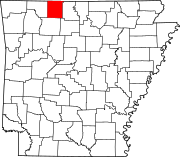Batavia, Arkansas
Batavia, Arkansas | |
|---|---|
| Coordinates: 36°15′14″N 93°13′01″W / 36.25389°N 93.21694°W | |
| Country | United States |
| State | Arkansas |
| County | Boone |
| Elevation | 1,532 ft (467 m) |
| Population (2020) | |
• Total | 328 |
| Time zone | UTC-6 (Central (CST)) |
| • Summer (DST) | UTC-5 (CDT) |
| Area code | 870 |
| GNIS feature ID | 2805620[1] |
Batavia is an unincorporated community and census-designated place (CDP) in Boone County, Arkansas, United States. It was first listed as a CDP in the 2020 census with a population of 328.[2]
Batavia is located on Arkansas Highway 392, 5.0 miles (8.0 km) west-northwest of Harrison.[3]
Batavia was formerly an incorporated town. In 1880, Roswell Underwood established the first post office in the former town, which he named Batavia after his hometown of Batavia, New York. The town was laid out in blocks. The first house on Main Street was built in 1912. [Arkansas State Highway 392] is where Main Street was once located. The post office was closed in 1955. During its heyday, businesses included stores, hotels, a canning factory, a train depot, stockyards, mills, a corn gristmill, and a blacksmith shop. There was also a school and churches. By 1926, the passenger railroad stopped going through Batavia. While the community is larger in terms of population and homes than it was as an incorporated town, there are fewer businesses.[4] Batavia township still exists (see township population history) without any current incorporated towns inside of it.
Demographics
| Census | Pop. | Note | %± |
|---|---|---|---|
| 2020 | 328 | — | |
| U.S. Decennial Census[5] 2020[6] | |||
2020 census
| Race / Ethnicity (NH = Non-Hispanic) | Pop 2020[6] | % 2020 |
|---|---|---|
| White alone (NH) | 304 | 92.68% |
| Black or African American alone (NH) | 1 | 0.30% |
| Native American or Alaska Native alone (NH) | 7 | 2.13% |
| Asian alone (NH) | 1 | 0.30% |
| Pacific Islander alone (NH) | 1 | 0.30% |
| Some Other Race alone (NH) | 3 | 0.91% |
| Mixed Race or Multi-Racial (NH) | 9 | 2.74% |
| Hispanic or Latino (any race) | 2 | 0.61% |
| Total | 328 | 100.00% |
References
- ^ a b U.S. Geological Survey Geographic Names Information System: Batavia, Arkansas
- ^ "Batavia CDP, Arkansas". United States Census Bureau. Retrieved April 7, 2022.
- ^ Boone County, Arkansas General Highway Map (PDF) (Map). Arkansas State Highway and Transportation Department. 2002. Retrieved January 6, 2012.
- ^ Moehr, Dennis; Ramsey, Regina, "Batavia", Reflections of Our Ozarks Past: 6
- ^ "Decennial Census of Population and Housing by Decades". US Census Bureau.
- ^ a b "P2 Hispanic or Latino, and Not Hispanic or Latino by Race – 2020: DEC Redistricting Data (PL 94-171) – Batavia CDP, Arkansas". United States Census Bureau.



